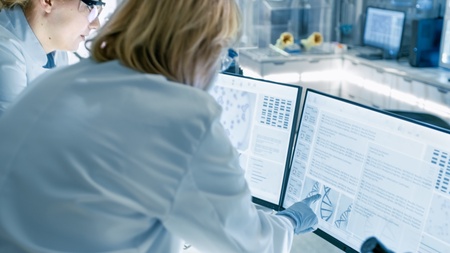A project jointly led by Professor James N'Dow will seek to use artificial intelligence to improve care for patients with prostate, breast and lung cancer.
The Innovative Medicines Initiative (IMI), a joint undertaking of the European Union and the European Federation of Pharmaceutical Industries and Associations (EFPIA), has announced the launch of OPTIMA (Optimal Treatment for Patients with Solid Tumours in Europe Through Artificial intelligence), a € 21.3 million public-private research programme that will seek to use artificial intelligence (AI) to improve care for patients with prostate, breast and lung cancer.
OPTIMA’s goal is to design, develop and deliver the first interoperable, GDPR-compliant real-world oncology data and evidence generation platform in Europe, to potentially advance treatment for patients with solid tumours in the three cancers.
To achieve this ambitious goal, OPTIMA has brought together 36 partners from across 13 countries to:
- Establish a secure, large-scale evidence data platform for prostate, breast and lung cancer that includes real-world data from more than 200 million people. With a focus on patient privacy, the platform will be GDPR-compliant. The interoperable platform will host datasets, data analysis tools, federated learning tools, AI algorithms and electronic decision support tools.
- Drive new knowledge generation by developing advanced analytics and AI models to identify, prioritise and fill the main knowledge gaps in prostate, breast and lung cancer – and propose improved clinical guideline recommendations.
- Develop AI-based decision support tools that can be employed in electronic health records (EHRs). These tools will help clinicians make care decisions based on the leading clinical practice guidelines for prostate, breast and lung cancer.
These new tools and models could allow for the processing of high-dimensional data across sources and the use of deep learning to identify factors that enable individualised, real-time care decisions – ultimately informing personalised treatment for patients with solid tumours.
The OPTIMA consortium consists of 36 multidisciplinary private and public stakeholders in the clinical, academic, patient, regulatory, data sciences, legal and ethical and pharmaceutical fields – and is being jointly led by Prof. Dr James N’Dow from the European Association of Urology and Academic Urology Unit at the University of Aberdeen and Dr Hagen Krüger, Medical Director Oncology, Pfizer Germany.
Prof. N’Dow explains; “OPTIMA’s main objective is to harness the potential of AI to enable healthcare professionals to provide the most optimal personalised care for each individual patient living with prostate, breast and lung cancer and their families.
"This is an ambitious goal and one that the entire OPTIMA consortium is dedicated to delivering, building on the diverse knowledge base and expertise of our consortium members. By working together, we hope to deliver meaningful improvements in cancer care.”
Dr Krüger adds:“While healthcare has begun to take advantage of AI to improve treatment for patients with cancer, there is still immense untapped potential to integrate these next-generation tools into care models and decision-making. We hope that OPTIMA will be a key driver in the development of personalised treatments that recognize each patient’s individual needs.”
Dr Pierre Meulien, Executive Director IMI, “The OPTIMA project brings together experts from a wide range of disciplines and organisations. It is therefore well placed to potentially deliver results that could fast-track the use of artificial intelligence in the care of people with cancer.”
With its diverse multidisciplinary membership, the OPTIMA consortium is uniquely positioned to develop healthcare evidence-generation practices for the incorporation of real-world evidence into clinical practice guidelines (CPGs). If successful, OPTIMA may also help to establish best practice procedures for CPG development that incorporate analytics and evidence informed by AI models.
OPTIMA is at the forefront of healthcare innovation in Europe, building on other IMI projects (such as EHDEN, PIONEER and Harmony) that are supporting the European Health Data Space (EHDS) – a European Commission initiative to promote better exchange and access to different types of health data to support healthcare delivery and health research and policy. If it is successful, OPTIMA could not only contribute knowledge and data to the EHDS, but may also inform European policy regarding the clinical deployment of AI algorithms in healthcare.


